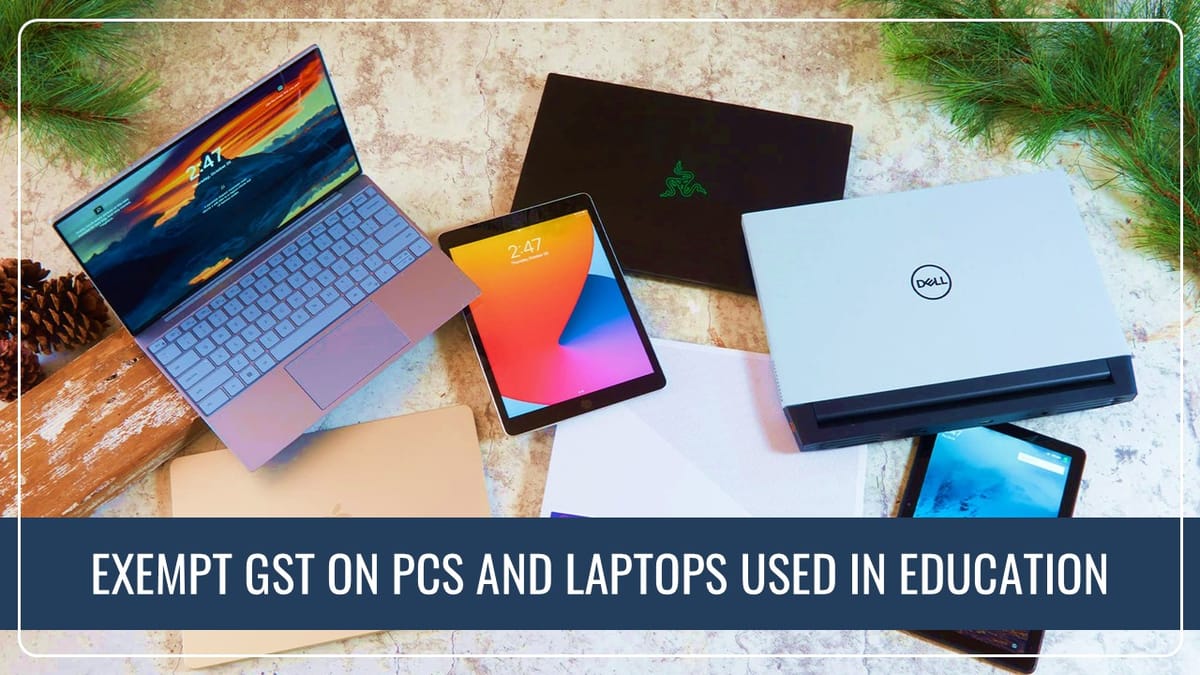Lenovo has recommended the introduction of a separate category for PCs and laptops used in education, as well as the exemption of an 18% GST rate on these devices.
Reetu | Sep 21, 2024 |

Lenovo India MD Supports Reduction in GST Imposed on PCs and Laptops for Students
Lenovo, the world’s largest manufacturer of personal computers and laptops by sales, is the second-largest player in India. Shailendra Katyal, the prolific Managing Director (MD) of Lenovo India, recently discussed the tech giant’s plans for the future in the tech landscape, the current market situation, and the current difficulties in India’s education sector, which is being held back significantly due to underutilization of technological resources.
The company is now entering the server market for artificial intelligence (AI), with plans to start producing servers in India at its Puducherry plant.
Shailendra Katyal gave a complete insight into the Company’s and Market’s situation following the COVID-19 pandemic, which caused shockwaves throughout all industries. While the epidemic disrupted the market (because of excessive demand and stressed supply networks), it has now recovered. The imminent end of support for Windows 10 and the transition to Windows 11, as well as AI breakthroughs, are all driving demand, particularly in the enterprise segment.
The MD shared his insights during a media interview.
The general opinion is that in India, elements such as a stable government, clear laws, production-linked incentive (PLI) schemes, and a stable currency have contributed to a good outlook, notwithstanding some continuing supply chain constraints caused by geopolitical issues. Lenovo feels hopeful about completing FY25 on a high note, owing to robust growth in its server business and new AI use cases.
Lenovo has stated its intention to increase its market share while maintaining that it has a strong market presence, albeit market share frequently varies due to the cyclical nature of sales and major transactions. The company has a strong presence in private education and very large enterprises, both of which are important markets. However, Lenovo has faced hurdles in the government sector, primarily due to procurement constraints imposed by India’s general finance regulations’ land border clause.
Lenovo has requested approval under this clause, and it is also supporting the PLI plan and the Make in India efforts, which will bring high-end design employment to the nation. Lenovo remains India’s number two PC brand.
The MD’s main point of disagreement is the absence of digitization in India’s educational sector. India, a country with a sizable population, has an equally huge educational system that spans regions, industries, economic levels, and groups. In light of this, Mr. Katyal emphasized the importance of introducing digitization in rural areas, which would greatly benefit the education sector by making it more accessible.
While private schools presume that students have access to laptops or computers, rural and government schools confront more immediate issues such as teacher shortages, with computer shortages serving as a secondary worry. Katyal underlined the importance of a collaborative effort across the ecosystem, including government participation, to increase digital penetration in classrooms.
Lenovo has recommended the introduction of a separate category for PCs and laptops used in education, as well as the exemption or reduction of the current 18% GST rate on these devices in order to make them cheaper and increase the market.
PC penetration in India’s main cities ranges between 50 and 60%, which is comparable to developed worldwide markets. However, in tier 2 and tier 3 cities, penetration falls to around 20%, while in rural areas, it is frequently less than 5%. Lenovo is attempting to make its devices more inexpensive in order to expand adoption, but Katyal emphasized that addressing this issue will require a broader regulatory framework, ecosystem support, and government backing.
Lenovo presently meets 35% of its India demand through its Puducherry factory, with the remaining supplied by its global network of eight manufacturing units, including key operations in China and Mexico. The Make in India initiative has raised production at the Puducherry facility from less than half a million units to 1.2 million units.
Katyal noted that the first half of FY25 demonstrated a relatively excellent performance. Lenovo’s Puducherry facility has considerable server manufacturing capability, and its PC manufacturing ecosystem is well-established. The corporation does not intend to build a new facility but rather collaborates with original design manufacturers (ODMs) to increase manufacturing in other states. Lenovo is also bringing more shared services and design roles to India as part of a larger goal to establish the nation as a key centre.
While Lenovo is now known as a PC manufacturer, Katyal indicated that the company will expand into a holistic tech solutions provider over the next few years, fueled by investments to support growth in the Indian market.
In case of any Doubt regarding Membership you can mail us at [email protected]
Join Studycafe's WhatsApp Group or Telegram Channel for Latest Updates on Government Job, Sarkari Naukri, Private Jobs, Income Tax, GST, Companies Act, Judgements and CA, CS, ICWA, and MUCH MORE!"